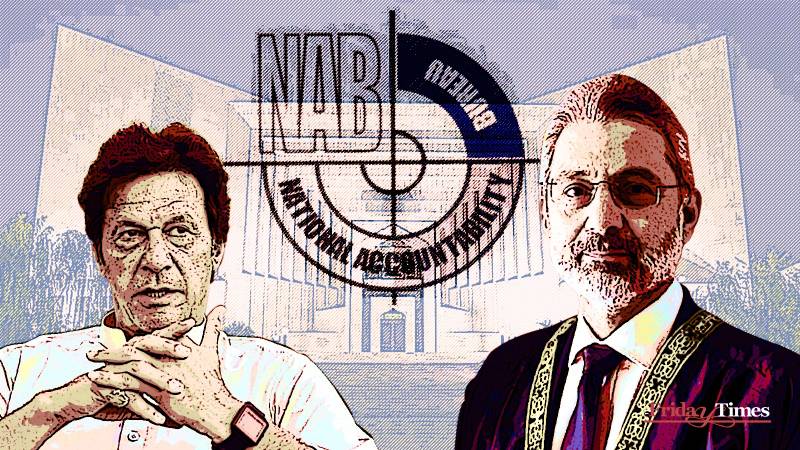
The appeal against a judgment, authored by former chief justice Umar Ata Bandial, setting aside recent amendments, has been decided unanimously, affirming and acknowledging the powers of the legislature to make or repeal laws while conforming to the settled principles of legal and constitutional interpretation. The five-member bench headed by Chief Justice Qazi Faez Isa has merely reiterated the age-old principle, namely, the Supreme Court has the power to set aside a piece of legislation if, upon a petition under Article 184(3), a matter of public importance is agitated before it with reference to enforcement of fundamental rights or violation of express provisions of the Constitution only.
Ironically, Imran Khan — or 'Mr Niazi', as the judgment refers to him — has been among the first to file an application before an accountability court to benefit from the Supreme Court's recent judgment. Quite paradoxically, his palpable belief and conviction during the hearings—which took hundreds of working hours of the court's time — based on an overly simplistic, half-baked and yet self-serving argument of selectively subjecting his opponents to a tool of political victimisation, i.e., the National Accountability Bureau (NAB) law, was quite troubling for the right thinking citizens of Pakistan, to say the least. Another reason why Imran Khan's petition cannot be taken seriously is that he had introduced some of the amendments to the law while in power but chose to challenge the same once he had been ousted through the vote of no confidence. It would be fair to say that, under the circumstances, his challenge to the law looks not only farcical but also quite laughable.
Being the author judge, Chief Justice Qazi Faez Isa has, however, taken pains to chart the history of the NAB law back to dictator General Pervez Musharraf's military rule when a show of allegiance to his usurped throne invariably meant exoneration from all charges of corruption under the NAB law which, according to the judgment, paved the way towards wrecking the Constitution. Strong words! In the judgment, CJ Isa makes it obvious that he wants to leave his legacy through his judicial pronouncements, whether or not pointing towards the originally conceived 'utility' of the NAB law as a tool of political engineering is relevant in the context of the appeal before him. For instance, he laboriously refers to the Practice and Procedure Act and what its effect on the petition was, perhaps, unnecessary so was the suggestion that since such a case was stipulated to be heard by a bench of five judges, therefore, Justice Mansoor Ali Shah should have refused to carry on as part of the bench. Furthermore, critics would argue that, since the bench was hearing a petition under article 184(3) of the Constitution, as an author judge, instead of obliquely reminding the parliament to repeal an unfair law like the NAO 1999, CJ Isa should have set aside the said law in its entirety in order to do 'complete justice' under Article 187 of the Constitution.
That said, a word about the petitioner himself who self-righteously believed in subjecting his opponents to the rigours of NAB investigations to decimate them politically but then jumped to file a plea for acquittal on the first opportunity available. Imran Khan, after successfully testing the gullibility of his followers to the maximum by twisting and convoluting the issue of corruption umpteen number of times, is quite unrepentant on wasting a considerable amount of the court's time, which could have been spent on deciding pending litigation of ordinary citizens.
Another way to deal with the above conundrum could well have been to impose a heavy fine upon the petitioner for filing a frivolous and self-contradictory petition to ensure such petulance does not find its way into the Supreme Court in future
On a lighter note, Chief Justice Qazi Faez Isa could have restrained Mr Niazi from taking benefit of the amendments to secure his own acquittal once upheld by the apex court, since the latter did not consider the NAB law as a tool of political victimisation. Sadly and predictably, the opposite has happened, as we know. Another way to deal with the above conundrum could well have been to impose a heavy fine upon the petitioner for filing a frivolous and self-contradictory petition to ensure such petulance does not find its way into the Supreme Court in future meticulously clothed as a high-profile political case of public importance.
As far as Chief Justice Isa is concerned, the recent ruling on NAB amendments was meant for not only deciding a question of law and Constitution, but for undoubtedly making use of the occasion to set out the contours of his legacy now that his tenure is ostensibly coming to an end. So much so that his recent address at the start of the new judicial year echoed and mirrored almost exactly what he wrote in the above judgment.
Only time will tell whether CJ Isa will be remembered for refusing to accept a constitutional amendment—still a hypothetical proposition—which could give him a chance to 'save' Pakistan from further chaos by steering its judicial ship from troubled waters to relative safety and calm, or someone who chose to quietly walk into the sunset when his time was up. The country has been on tenterhooks for months to discover the answer.

